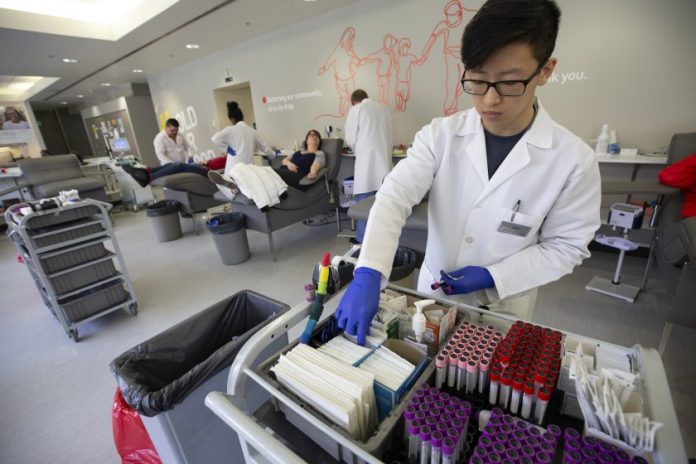
Just hours after President Donald Trump announced emergency authorization to treat COVID-19 patients with convalescent plasma, a move he called “a breakthrough,” Seattle researchers voiced skepticism about its effectiveness to treat the deadly virus.
“This is just a gigantic exaggeration. I’ve been using this for my patients in ICUs across Seattle since March. It’s pretty widely available. Do we think there is possibly a benefit? Yes we do. Do we think it’s harmful? Probably not. Is it a miracle cure? Definitely not,” said Dr. Vin Gupta of the University of Washington’s Institute for Health Metrics and Evaluation, immediately following the president’s announcement. “This is not going to change a lot.”
Dr. Gupta questioned the timing of the announcement on a Sunday prior to the start of the Republican National Convention on Monday. He also said there is very little conclusive data about the benefits of convalescent plasma.
Dr. Corey Casper leads the Seattle-based Infectious Disease Research Institute (IDRI) and has been active in clinical trials for COVID-19 therapies and a vaccine. He also expressed some doubts about just how big the announcement may be.
“I’m not sure I would categorize it as a breakthrough. I mean, I think we’re all desperate for tools that we can use to treat patients with COVID. And there just aren’t that many that we have. This therapy is something that has shown mixed results in early studies,” said Dr. Casper.
The treatment involves taking blood plasma from patients who have recovered from the coronavirus and are rich in antibodies.
“I think that this approach is one that may shorten the duration of illness in patients with moderate disease and injury. (IDRI) has been focusing more on approaches that help you generate your own immune response as opposed to relying on borrowing someone else’s immune response,” explained Dr. Casper. “These therapies, I think, ultimately will lead to a longer immune response and a stronger immune response. So I think this is a good first step. I’m eager that the work that we’re doing here at IDRI as well as others around the country will introduce more effective therapies. We’re taking baby steps against this disease, and we really need to begin to take giant steps.”
Dr. Casper said he does remain hopeful, based on early data, about a vaccine.
“I think it’s likely that we’ll have some form of a vaccine by the end of this calendar year,” he said. “I don’t know that it will be the most effective vaccine. I don’t know that everyone will be able to have access to it. But I think we’ll have a start. I think certainly by the next half of 2021, we’ll start to see more effective vaccines that I think will be applicable to broad ranges of the population.”
The president’s authorization on Sunday makes it easier for some patients to obtain the treatment but is not the same as full approval by the Food and Drug Administration.































